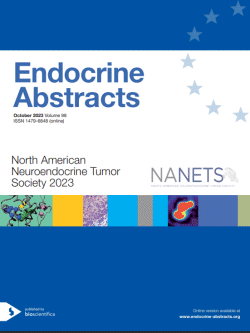Abstracts
Trials In Progress
ea0098t1 | Trials In Progress | NANETS2023
ACTION-1: A randomized Phase Ib/3 trial of RYZ101 compared with SoC in SSTR+ well-differentiated GEP-NET with progression following Lu-177 SSA
Hope Thomas A. , Halperin Daniel , Strosberg Jonathan , Jacene Heather , E.T. Tesselaar Margot , Kunz Pamela L. , Ferreira Denis , Li Joanne , Ma Kimberly , Rearden Jessica , Moran Susan , Singh Simron
ea0098t2 | Trials In Progress | NANETS2023
Phase 2 study of nab-sirolimus in patients with well-differentiated and advanced/metastatic neuroendocrine tumors of the gastrointestinal tract, lung, or pancreas
Demeure, MD Michael J. , Cohn, MD Allen L. , Seery, MD Tara , Ding, MS, MA Li , Aziz, MD Usman , Navarro, MD Willis , Paulson, MD Scott
ea0098t3 | Trials In Progress | NANETS2023
Phase 1/2 trial of Pb-212-VMT-alpha-NET in GI neuroendocrine tumors and pheochromocytoma/paraganglioma previously treated with radioligand therapy
Lin Frank I. , Del Rivero Jaydira , Carrasquillo Jorge , Shamis Inna , Zou Joy , Turkbey Baris , Klubo Joanna , Mena Esther , Lindenberg Liza , Chen Clara , Herscovitch Peter , Millo Corina , Pacak Karel
ea0098t4 | Trials In Progress | NANETS2023
Phase 2, multicenter, open-label basket trial of nab-sirolimus for malignant solid tumors harboring pathogenic inactivating alterations in TSC1/2 (PRECISION I)
Iyer, MD Gopa , Demeure, MD Michael J. , Ding, MS, MA Li , Schmid, PhD Anita N. , Navarro, MD Willis , Kwiatkowski, MD, PhD David J. , Rodon Ahnert, MD, PhD Jordi
ea0098t5 | Trials In Progress | NANETS2023
Phase 3 LEVEL trial of 177Lu-edotreotide vs everolimus in patients with advanced neuroendocrine tumors of lung or thymic origin (GETNE-T2217)
Capdevila Jaume , Fazio Nicola , Alvarez Rosa , Ansquer Catherine , Baldari Sergio , Baudin Eric , Benavent Marta , Benini Lavinia , Beron Amandine , Berruti Alfredo , Cingarlini Sara , del Olmo-Garcia Maribel , Deshayes Emmanuel , Garcia-Alvarez Alejandro , Garcia-Carbonero Rocio , Haissaguerre Magalie , Hernando Jorge , Anido Herranz Urbano , Jimenez-Fonseca Paula , Lepage Come , Llana Belen , Molina-Cerrillo Javier , Panzuto Francesco , Pubul Virginia , Sansovini Maddalena , Tafuto Salvatore , Taieb David , Teule Alex , Versari Annibale , Villacampa Guillermo , Walter Thomas
ea0098t6 | Trials In Progress | NANETS2023
Genetic profiling in the randomized controlled phase 3 COMPOSE trial of 177Lu-edotreotide for well-differentiated aggressive grade 2/3 gastroenteropancreatic neuroendocrine tumors
Halfdanarson Thorvardur R. , Capdevila Jaume , Halperin Daniel M. , Herrmann Ken , Kong Grace , Mailman Josh , Reidy-Lagunes Diane , Srirajaskanthan Raj , Sierras Cristina , Rotger Amanda
ea0098t7 | Trials In Progress | NANETS2023
Phase 1 trial of Pb-212-VMT-alpha-NET in select metastatic or inoperable somatostatin receptor positive tumors
Lin Frank I. , Del Rivero Jaydira , Thomas Anish , Srinivasan Ramaprasad , Charalampos Floudas , Carrasquillo Jorge , Shamis Inna , Zou Joy , Turkbey Baris , Mena Esther , Lindenberg Liza , Chen Clara , Herscovitch Peter , Millo Corina , Pacak Karel
ea0098t8 | Trials In Progress | NANETS2023
Status of the ongoing SORENTO clinical trial: Assessing efficacy and safety of high-exposure octreotide subcutaneous depot in patients with GEP-NET
Singh Simron , Capdevila Jaume , Ang Chan Jennifer , W de Herder Wouter , Grozinsky-Glasberg Simona , Halfdanarson Thorvardur , M Halperin Daniel , Mailman Josh , Hellstrom Lisa , Svedberg Agneta , Tiberg Fredrik , Ferone Diego
ea0098t9 | Trials In Progress | NANETS2023
Phase 1-2 trial of vesicular stomatitis virus expressing human interferon-β and NIS (VSV-IFNβ-NIS), with ipilimumab and nivolumab, in patients with neuroendocrine carcinoma
McGarrah Patrick W. , Naik Shruthi , Halfdanarson Thorvardur R. , Shanshal Mohamed , Whye Peng Kah , Russell Stephen J. , Adjei Alex A. , Molina Julian R.
ea0098t10 | Trials In Progress | NANETS2023
Phase Ib trial of cabozantinib (Cabometyx®) combined with Lu-177 DOTATATE radioligand therapy in patients with advanced, somatostatin receptor positive NETs.
F Kennecke MD, MHA, FRCPC Hagen , Yamasaki, RN Lena , Kasi, MD, MPH Anup , Herz Katherine , Mittra MD Erik S.
ea0098t11 | Trials In Progress | NANETS2023
NET RETREAT: a Phase II Study of 177Lutetium-Dotatate Retreatment vs. Everolimus in Metastatic/Unresectable Midgut NET
Chauhan Aman , O'Callaghan Chris , Myrehaug Sten , Bodei Lisa , Kunz Pamela , Dasari Arvind , Strosberg Jonathan , Alexander Stefanie , Cheung Winson , Singh Simron
ea0098t12 | Trials In Progress | NANETS2023
Neuroendocrine tumors AI-based clinical trial search tool eases clinical trial discovery for patients and health care professionals
Mailman Josh , Ralic Danielle , del Rivero MD Jaydira , Gericke MD Germo , Halfdanarson MD Thorvardur R. , Herrmann MD Ken , Hollander Ronald , Albert Fisher Jr. MD George




